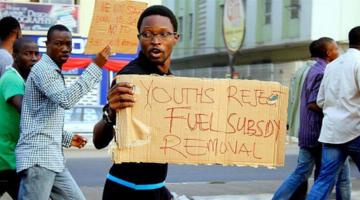BAR Book Forum: Chris A. Barcelos’ “Distributing Condoms and Hope”
Replacing cops with social workers could “reproduce the same kinds of harm,” as this author explains.
“We must also confront the deep histories of racism in the professions of social work and public health.”
In this series, we ask acclaimed authors to answer five questions about their book. This week’s featured author is Chris A. Barcelos. Barcelos is Assistant Professor of Women's, Gender, and Sexuality Studies at the University of Massachusetts Boston. Their book is Distributing Condoms and Hope: The Racialized Politics of Youth Sexual Health.
Roberto Sirvent: How can your book help BAR readers understand the current political and social climate?
Chris Barcelos: In the wake of uprisings in the summer of 2020 following the police murders of George Floyd, Tony McDade, Breonna Taylor and countless others, activists and (some) policymakers across the United States have called for defunding or dismantling the police and replacing them with social workers and public health professionals. Distributing Condoms and Hope helps us to see how this well-intentioned strategy nonetheless has the potential to reproduce the same kinds of harm.
Although there is most certainly a need to replace policing with services that actually support– rather than regulate, discipline, criminalize, and/or murder–vulnerable people, we must also confront the deep histories of racism in the professions of social work and public health. These are professions historically built on regulating and disciplining black and brown bodies (and disabled bodies, and gender nonconforming bodies, and poor folks and on and on). Both social work and public health are predominately white professions in which cisgender women “help” marginalized people in communities they are not part of. This work often harms more than it helps, and reproduces racism, classism, ableism, homophobia, and transphobia at individual, institutional, and structural levels. We cannot abolish the police and replace racist cops with racist social workers and public health workers.
What do you hope activists and community organizers will take away from reading your book?
I hope that activists and community organizers will gain a better understanding of all the ways that the nonprofit industrial complex affects our work. This is something I talk about a lot in the classroom—many of my students in women’s, gender, and sexuality studies will go on to work in nonprofit organizations and often find themselves disillusioned when the work tries to disavow their queer, feminist, and antiracist education. What I try to teach them, and what the book emphasizes, is that we must learn to both critique and work within the oppressive structures we inhabit (while also maintaining a long-term vision of abolishing them). This also includes prioritizing the leadership of those who are most impacted by the issues at hand. For some students and readers, this means learning to step back and leverage your privilege rather than centering yourself and your expertise.
We know readers will learn a lot from your book, but what do you hope readers will un-learn? In other words, is there a particular ideology you’re hoping to dismantle?
There is a pretty intractable discourse of “teen pregnancy as pathology” in our culture that Distributing Condoms and Hope explicitly works against. Teen pregnancy is one of those issues (human trafficking is another one) that are so overdetermined that it precludes thinking critically about them. We should always take note when we encounter social and political issues that unite people across the political spectrum. In other words, pregnant and parenting teens are figures that everyone loves to hate. It’s not uncommon to see policy makers, researchers, and/or activists—even some feminists—use the supposed pathology of teen childbearing as a tool to get funding to promote certain public policies.
“Pregnant and parenting teens are figures that everyone loves to hate.”
Relatedly, I hope that the book will help readers unlearn racialized “savior discourses” that position vulnerable communities as in need of intervention from outsiders. In writing the book I struggled to make clear that social workers and public health professionals are generally not explicitly malicious in their work, but nevertheless reproduce racism, heterosexism, classism and so on. So many of us getting caught up in the structures of the nonprofit industrial complex and are unable to see how we are complicit in it.
Who are the intellectual heroes that inspire your work?
This is difficult to answer because I work across so many fields and topics! In terms of reproductive justice scholarship, I first read Dorothy Roberts’ Killing the Black Body in college and it blew my mind. There is still no better primer on the politics of race and reproduction. I continue to be inspired by her more recent work on the fallacies of race-based medicine, as well as by her accessible writing style with clear connections to policy and practice.
Jennifer Nash’s work is indispensable for thinking critically about intersectionality, both as a feminist methodology and as an affective investment in the field of women’s, gender, and sexuality studies. For thinking about the sociology of racialization, I always return to the work of Eduardo Bonilla-Silva. Feminist historian and my mentor Laura Briggs taught me to always think of sexuality in terms of empire.
Like anyone who studies sexuality education, I am indebted to Jessica Fields for her call to ask what we want sex ed to promote, and not simply prevent. I have also been really inspired by the work of Martin Manalansan, for his theorizing of queer as mess and the capaciousness of queer of color archives. Finally, at the risk of sounding banal, I really am inspired by the intellectual work of everyday people theorizing from the margins, especially my students.
In what way does your book help us imagine new worlds?
Imagining new worlds is pretty central to my project in the book. The title itself is a riff on the neoliberal trope that simply having “hope” for a better future can lead to better health outcomes in a heteropatriarchal white supremacist society. The book helps to imagine the abolishment of the nonprofit industrial complex, the depathologization of teen childbearing, and a world in which the lives of racialized sexual and reproductive others are neither stigmatized or romanticized. Distributing and Condoms and Hope helps to imagine strategies to ask more of public health and sexual education.
Roberto Sirvent is a teacher living in California.



















